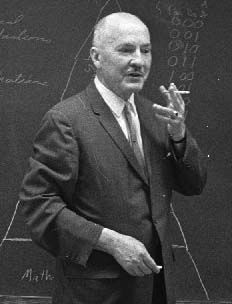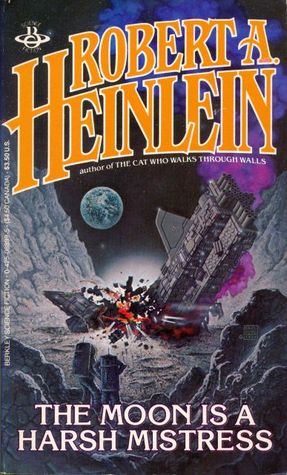
I used this image solely because Heinlein was smoking in it.
When writing about the future, authors have three choices. They can describe a world as hopeful and flawed as the present one. They can create a more utopian world, where life is better and humans have solved some of their eternal problems. Lastly, they can build a relative dystopia, where daily existence is a struggle and there is little to look forward to. Let’s examine these last two.
Before proceeding, one should note that neither a cataclysm nor a lower standard of living make a dystopia per se. Consider Sterling Lanier’s Hiero’s Journey; nuclear war might have wiped out much of human civilization, and the survivors possess primitive technology relative to the modern world. Yet, their societies are cheery, united, and enjoy a comfortable existence. Moreover, there is even cause for hopefulness with the rediscovery of old technology and further exploration of the land.
Amusingly, the dichotomy between these two approaches can be seen in the works of a single writer, Robert Anson Heinlein.
Earlier in his career, especially before 1965, Heinlein wrote books with very utopian views of the future. The large governments of the future, even global ones, will be competent and ruled by wise, virtuous individuals. Society will function efficiently and generally be a nicer, more pleasant place to live in. Consider the military society of Starship Troopers and its simultaneously intelligent, experienced, and decent leaders. Or the wonderfully clean, efficient Los Angeles in The Door Into Summer. Or the excellent globalist governments in Double Star, whose biggest threat is a few nutcase terrorists. Or the pleasant meritocracies in most of his juveniles, where the young protagonists start out in bad situations either because of pauperdom (Citizen of the Galaxy, for instance) or unfortunate individual circumstances (Starman Jones). Of course, at the time Heinlein was still very much a leftist who believed in socialism. Even in his last juvenile (although there is debate over its designation as such), Podkayne of Mars, published in 1963, Heinlein espouses a reasonably hopeful view of the future. Granted, it’s less idyllic than his works of the 50’s, as our protagonists visit a dreary planet employing a soft form of slavery, and the main protagonist’s wise uncle, a senator on Mars, notes with a weary tone the sacrifices and blood that must be shed to ensure a decent world. And even with that sacrifice, it’s imperfect.

One of very best science fiction books ever written.
However, it’s beginning with The Moon is a Harsh Mistress in 1965 that Heinlein began writing noticeably dystopian worlds. Here, the government, far from being benevolent and functional, is evil, greedy, and often the greatest obstacle to human happiness. Misery and catastrophe abound in the future, often a product of the very globalist governments he had previously championed. Individuals must carve out some happiness for themselves in this unjust, often cruel world. Examples include Friday and The Glory Road. This coincided with the author becoming more right-wing and libertarian, as well as his increasing age and health problems.
I enjoy Heinlein’s work from both periods, but I prefer his later works. They feature deeper and more creative ideas, and are more realistic and memorable. On the contrary, some of his earlier novels, and not merely the juveniles, feel slightly silly, despite their excellence.
Moving beyond Heinlein, there are many writers whose fiction is defined by a morbid view of the future. Consider Philip K Dick and his hellscapes, providing a suitable backdrop for his insane, mystic tales. My favorite science fiction writer, Robert Sheckley, despite maintaining a sense of humor, wrote about very dark futures. And these provided a suitable environment for his biting satire and wry observations about human nature.
On the opposite side, a Clifford Simak wrote successfully about utopians futures. However, they never struck me as masterpieces, merely good adventure novels. Part of that is that the setting resembled a nice college campuses or country home from the 1950’s, only with more advanced technology.
So are dystopian works the way to go? After all, most of the best books and writers seem to employ them. The answer is…not necessarily.
For me, dystopias are also the most likely to backfire. While they may be more successful if done correctly, they can be far more of a disaster if they’re flawed. While the worst condemnation I can give Heinlein’s earlier works, Simak’s The Goblin Reservation, or Niven’s Ringworld that they’re slightly naive and simplistic, a poorly done dystopia will lose me immediately.
One obvious problem is when authors inject their current political fears into a horrible manifestation of the future. For a particularly hamfisted example, consider the recent YA book American Heart, whose review controversy was covered by Vox. The book’s paranoid fears about Trump are laughably idiotic even now. How much worse will they look in a few years?
While nowhere near as bad, numerous science fiction books in the 60’s and 70’s worried about a possible food shortage. If they made this a defining aspect of a dystopia, the work greatly suffered, as an agricultural revolution was right around the corner. With that reality, a later reader can’t take the world seriously from the outset.
In other cases, a writer simply hasn’t thought through the logic of their world well enough, and is also made a fool of by history. I absolutely despise A Brave New World, and it all begins with its implausible caste system. Written at a time when one’s station in life was more fluid and fuzzy than ever, and the ideology of equality was gaining power, it instead believed in humanity being regimented into classes more rigid than anything seen in India or any European aristocracy.
Why such variance? It’s because utopias can be vague about why the future is nicer. Dystopias, however, usually have to be more explicit about what made the world so bad. Thus, they are a double-edged sword. If the explanation doesn’t pass muster, neither does the book.
My personal advice to writers is to utilize a dystopia if you have an interesting, reasonable idea for one. However, don’t choose one simply because it seems more cool and mature, as that’s a sure path to failure. In that case, use a world similar to quality to our own, or a more utopian one.
Good points. Dystopias can definitely be tricky to pull off. Terence Hanley at the excellent TELLERS OF WEIRD TALES blog has written two fine articles on utopias and dystopias here:
http://tellersofweirdtales.blogspot.com/2015/08/endnote-to-weird-tales-controversy.html
http://tellersofweirdtales.blogspot.com/2016/08/more-utopia-more-dystopia.html
Ringworld‘s future is a dystopia for the poor and an utopia for the rich and powerful. Not a naive or childish assumption, certainly not unhistorical. And of course, different stories use different parts of a society for their setting. It’s worth adding that lots of people in any society described by Heinlein were happy and rich, and lots of people in any society described by Heinlein were miserable and poor. The best of times, the worst of times is a normal setting for any story that uses the technique of Balzac, the technique of a naturalist novel. The technique of setting your story in well-described status detail that’s oft said, but never so well put as when a good naturalist novelist does it. The technique of science fiction is the technique of a naturalist novel, with speculations- If This Goes On. The technique of Wells. Niven does it. Heinlein did it. Simak did it.
Brave New World is a comic book world, but as such it’s pretty well done.
-
Very interesting analysis. My question is why shift? Not all of it can be laid on Campbell. So what changed?
I’m kinda fed up with the genre since it aggravates bad message writing message fiction. Part of the no escapismxavier
When I first read Brave New World (around 1978) I would have agreed that it was an utterly implausible future. Of course, in the pre-Reagan pre-Thatcher pre-JPII the likely future looked much more like 1984. However, now that the Cold War has ended I can see what Huxley was getting at. His dystopia was a world of consumers who would do what they were told, and would be specifically bred and educated to do what they were told, as long as they continued to consume.
Just imagine if Zuckerberg or Bezos created their ideal society. How would it differ from BNW?
-
That’s precisely what BRAVE NEW WORLD was. Huxley’s projection of Eevil capitalism run amuck and taking over the world. The perfect civilization according to Huxley’s idea of Henry Ford.
The fact that most Eevil Capitalists become that by selling something people actually want, and it is their heirs who want to create a captive audience so they don’t have to keep working at making something those peasants actually want–that went right over his head.
I believe that what makes a story Utopian or Dystopian (or, if you happen to be Samuel Delany, “An Ambiguous Heteropia”) is the deliberate inclusion of a political message as part of the story.
It is not simply that the day to day lives of the citizens of a region are better or worse than the present day, it is the assumption that those lives are impacted by a political system, and that a different political system would yield a different standard of living.
Heinlein did, frequently, inject his political beliefs into his work, but not always. I wouldn’t call “The Star Beast” or “Have Spacesuit Will Travel” Utopian because his assumptions regarding the rising standard of living of his characters was based on a faith in technology, not politics.
In the same way I wouldn’t consider Philip Dick’s work Dystopian, because the horror and decay of, say “VALIS” or “A Scanner Darkly” is shown as inevitable, a result of the universe tending to fall apart. He may have been Left-leaning just by virtue of the time and place he lived, but I certainly don’t recall any of his stories that implied that a Leftist government would screw things up less than a Capitalist one.
-
By the time he died, PKD had gone full-on libertarian.
Interesting that you despise Brave New World and call it implausible, since it more or less has come true.